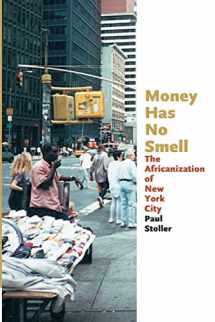
Money Has No Smell: The Africanization of New York City
Book details
Summary
Description
In February 1999 the tragic New York City police shooting of Amadou Diallo, an unarmed street vendor from Guinea, brought into focus the existence of West African merchants in urban America. In Money Has No Smell, Paul Stoller offers us a more complete portrait of the complex lives of West African immigrants like Diallo, a portrait based on years of research Stoller conducted on the streets of New York City during the 1990s.
Blending fascinating ethnographic description with incisive social analysis, Stoller shows how these savvy West African entrepreneurs have built cohesive and effective multinational trading networks, in part through selling a simulated Africa to African Americans. These and other networks set up by the traders, along with their faith as devout Muslims, help them cope with the formidable state regulations and personal challenges they face in America. As Stoller demonstrates, the stories of these West African traders illustrate and illuminate ongoing debates about globalization, the informal economy, and the changing nature of American communities.


We would LOVE it if you could help us and other readers by reviewing the book
Book review



